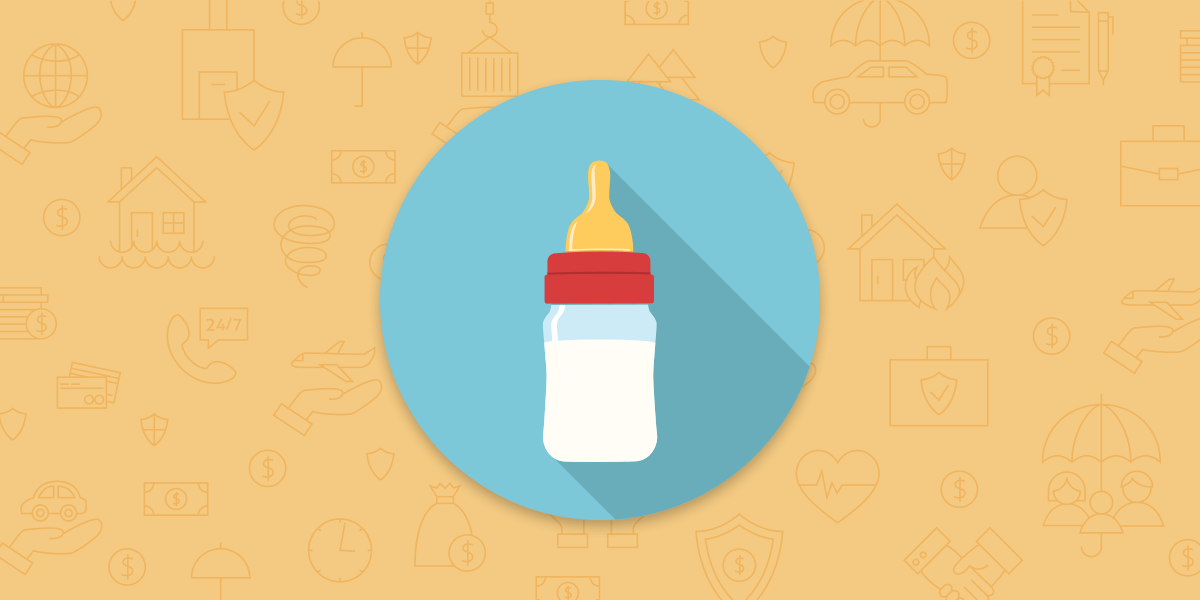
Being a first-time parent can bring plenty of first-time worries. While it can be hard to think about the future when you’re facing today’s responsibilities (and with little to no sleep!), planning for your future has never been more important.
Before you became a parent, you may not have given life insurance a second thought. But now that you’ve got a child who is relying on you, it’s the perfect time to ensure they’re cared for no matter what may happen to you.
Here are five reasons why new life insurance is a smart idea for new parents.
1. Life Insurance Helps Replace Your Income
Would your spouse or partner be able to support your new baby if you should pass away? Chances are the answer is no.
According to the Insurance Barometer Study, half of the households in the United States would feel the financial burden from the loss of the family's primary wage earner in only six months.
Even more sobering, the study found that one in three households would immediately experience difficulties paying their living expenses without the primary wage earner's salary.
2. Life Insurance is More Affordable Than You Think
There's a perception that purchasing high-quality life insurance is expensive. While your actual cost for life insurance is tied to a number of factors including your age, general health, and type of policy, it typically costs less than what you might expect.
Term life insurance, for example, can be purchased for a specific time period that spans until your youngest child graduates from college. It often costs less than $20 a month if a healthy 30-year old purchased a $250,000 20-year plan.
3. Younger People Save More Money
As you age, the same life insurance policy will only become more expensive. The time to make that investment is now.
All things being equal, purchasing life insurance when you're a healthy 30-year old is more affordable than if you are a still-healthy parent who's 40 or 50. In fact, you could see the premiums increase by two or even three times if you wait 10 or 20 years to purchase a life insurance policy.
4. Get Protection Against Debt
As new parents, it's likely that you also have a mortgage on a home that doesn't have very much equity built up in it. Life insurance can not only be used to pay living expenses, it can also help protect the family's home from being sold off to meet other debts and financial obligations.
5. Worry Less About Funds for College
Without life insurance, your dreams of a college education for your children could simply evaporate. In today's highly competitive job market, a college education provides the option for a better future for your children.
If a parent dies unexpectedly, the costs of living expenses, coupled with the rising costs of higher education, could mean that attending college is simply not an option.
6. Stay-at-Home Parents Need Life Insurance, Too
If one parent stays home to care for the children, your family can still benefit from that parent having a life insurance policy. Salary.com calculated the value of a stay-at-home mom, and found the income equivalent of a SAHM to be approximately $113,000 annually. Imagine if something happened to that spouse and suddenly you had to pay for full- or part-time childcare, at the bare minimum, and additional expenses such as housekeeping, cooking, or laundry services, as well.
The same holds true for a parent who works part-time or when there is an earnings discrepancy between the two parents. Think about what the loss of that money would mean to the family's ability to provide for your children and purchase a life insurance policy for that parent as well. Every member of the family has value, and a loss of income isn’t the only incident to insure against.
7. You Want More Coverage
Fortunately, many companies offer life insurance as part of their employee benefits package.
Unfortunately, the amount of its payout in the event of a death tends to be only about twice the amount of your base salary. While it might seem like enough to get by on for the short term, what happens when that money runs out?
Long-term expenses, such as your mortgage and your children's college funds, could take a huge bite out of this amount.
Another important caveat to workplace life insurance is that it doesn't go with you if you lose your job or move on to a new opportunity.
When your children are young, it can be tough to think about things like life insurance. But when you have a brand new baby relying on you for a lifetime of care, it’s more important than ever to be sure you can provide for your family no matter what happens tomorrow.